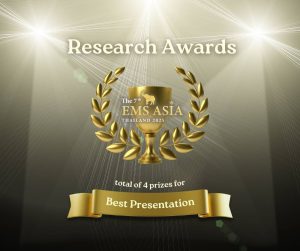

Abstract Submission
** Presenter agreement
All presenting authors must agree to the conditions mentioned when submitting an abstract:
Abstract submission types:
The Research Committee reserves the right to determine whether a submission is accepted as an oral or a poster presentation and its decision is final. The abstract or poster may be scheduled for presentation or display on any day during the conference.
“Best Young Investigator presentation”: 5 excellent abstracts will be selected among the applications, and awarded.
Notes:

Best Oral Presentations:
• 1st Prize: THB 5,000
• 2nd Prize: THB 3,000
• 3rd Prize: THB 2,000
Best Poster Presentation:
• Prize: THB 3,000